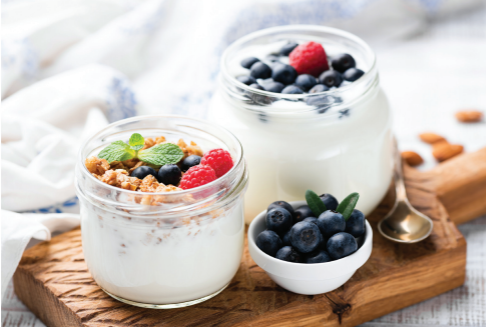It is important to moderate sugar and fast-acting carbohydrate intake. Some people with Parkinson’s disease find that eating sugar and fast-acting carbohydrates improves their motor and non-motor symptoms. It is theorized that the increase in sugar intake promotes increased insulin metabolism, which in turn increases dopaminergic neuron firing. In addition, several studies have looked at the connection between depression in PD and increased fast-acting carbohydrate consumption, suggesting that increased sugar intake triggers the brain reward system, balancing out the decrease in dopaminergic neurons.
Unfortunately, excessive sugar intake comes with health risks such as diabetes, obesity and even progressive neurodegeneration over the long-term.
A healthy lifestyle including The MIND Diet (Mediterranean-DASH Intervention for Neurodegenerative Delay), meditation and exercise can also facilitate production of dopamine to support brain health, while promoting other health benefits and overall well-being.
- Start the day with a high protein, low sugar, healthy complex carbohydrate breakfast.
- Choose whole, nutrient-dense food: eat 3 meals and 1-2 snacks throughout the day.
- Bitter tastes can moderate your craving for sweets. Make sure to have at least 1 cup of bitter vegetables such as leafy greens, kale, broccoli rabe, Swiss chard, spinach, arugula, endive, dandelion greens, cilantro, radicchio, radishes or kohlrabi.
- Choose alternatives to sweetened desserts: colorful berries, fresh fruit, Greek yogurt with cinnamon or fruit, baked fruit with cream or dark chocolate.
- Choose dates for added sweetness. Dates provide a natural source of sugar called fructose. They also contain fiber, antioxidants, vitamins and minerals which make them a healthier alternative to white, refined sugar.
- Drink only unsweetened beverages: water, sparkling water with a squeeze of lemon or lime, cucumber and mint water, herbal and fruit teas, unsweetened coffee, and tea.
- Avoid sugar laden dressings and sauces. Flavor foods with dried herbs and spices, fresh chili, spicy mustard, vinegars and flavored oils, harissa paste or pesto.
- Try to reduce stress and choose alternative plans besides foods to soothe or reduce feelings of stress.
- Make an exercise plan – even a daily walk can help with cravings.
- Get plenty of sleep. When we are sleep deprived, we seek comfort foods and sweets.
- Try a 30 day challenge to reduce or eliminate refined sugars from your diet. You may notice the flavors of foods, a feeling of well-being and less gastrointestinal distress and bloating.

REFERENCES
Haas J, Berg D, Bosy-Westphal A, Schaeffer E. Parkinson’s Disease and Sugar Intake-Reasons for and
Consequences of a Still Unclear Craving. Nutrients. 2022 Aug 8;14(15):3240. doi: 10.3390/nu14153240. PMID:
35956417; PMCID: PMC9370710.
Palavra N.C., Lubomski M., Flood V.M., Davis R.L., Sue C.M. Increased Added Sugar Consumption Is Common in
Parkinson’s Disease. Front. Nutr. 2021;8:628845. doi: 10.3389/fnut.2021.628845.
REF: https://www.healthline.com/nutrition/benefits-of-dates
REF: https://www.theracycle.com/resources/diet-and-supplements